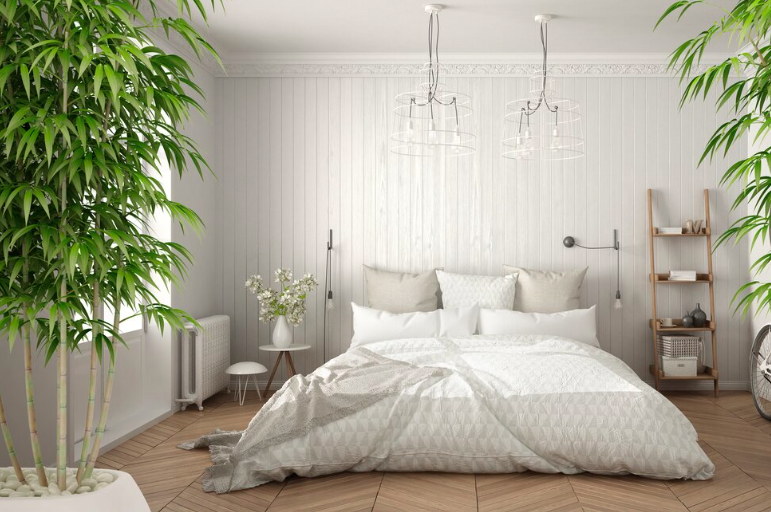Article & photo courtesy of USNews
Add balance and harmony to your bedroom by carefully arranging furniture, artwork and home decor.

When applied to interior design, feng shui involves carefully arranging furniture, artwork and home decor to achieve a peaceful balance. (GETTY IMAGES)
The ancient Chinese art of feng shui focuses on creating harmony and balance with nature; “feng” means wind and “shui” means water. It is rooted in the Taoist philosophy, in which chi (or Qi) is the life force or energy found in everything on earth.
When applied to interior design, feng shui involves carefully arranging furniture, artwork and home decor to achieve a peaceful balance. The whole house can be designed or decorated following the principles of feng shui, but individual rooms – particularly the bedroom – can especially benefit from more harmony.
“Feng shui is all about balance and peace in the bedroom,” says Amy Youngblood, founder and lead designer of Amy Youngblood Interiors in Cincinnati. “Arranging furniture and keeping things organized will ensure you have a clear space to help ease and clear your mind. It creates comfort while maintaining a beautiful and simple design.”
How to Apply Feng Shui Principles to Your Bedroom
While hiring an interior designer experienced in the fundamentals of feng shui is one way to promote balance in a bedroom, open-minded DIYers can tackle some of the tasks on their own. Here are some tips from the pros on how to apply feng shui to bedroom design.
Declutter
You’ve heard it time and again from everyone from home stagers to home organizing experts: Get rid of unnecessary items. Not surprisingly, a clutter-free bedroom – or any room, really – is excellent for feng shui. “The tremendous effect it will have on the way you feel and the energy flowing into your home is shocking,” says Joshua Smith, principal and founder of Joshua Smith Inc., based in New York City.
Create Clear Pathways
Is your bedroom a tangle of furniture? Is the floor covered in cast-off clothes and shoes? (No judgment here.) Rearranging items and tidying up isn’t just for aesthetics; Youngblood says you’ll also “create clear pathways for easy and peaceful flow.”
Remove Negative Symbols
Take a look at the artwork or decor in your room. Does any of it exude negativity either in thought or design? If so, it’s got to go. “Choose artwork and other objects that carry uplifting energy,” says Smith.
Open a Window
Fresh air is always a good thing, but it’s excellent for feng shui. “Fresh air also circulates the energy or chi of your home while increasing oxygen levels and eliminating airborne bacteria,” Smith says.
Let the Sunshine In
Natural light is “a feng shui must” says Devin Shaffer, lead designer of Decorilla Interior Design in San Francisco, though it’s tricky to achieve in a bedroom, where darkness is key for a good night’s sleep. To achieve the right balance, he recommends blackout curtains, noting you can add blackout lining to your current window treatments as well.
Decorate in Pairs
Having two of the same pieces of furniture offer coveted balance, Smith says. Single people searching for a partner have an opportunity to let their bedroom design attract a mate. Instead of a single nightstand on one side of the bed, Smith suggests putting one on both sides, as well as leaving some space in the closet for a partner’s clothing and shoes. “(This arrangement) will invite partnership energy and love into your home,” he says.
Add a Plant
Skip the faux version and add an easy-to-care-for plant in the bedroom. “They cleanse the air and bring vibrant chi into your home,” Smith says. Aside from the vibrant green color, a plant quite literally adds life to any space.
Arrange Mirrors Carefully
Some design experts will say to remove mirrors altogether from the bedroom. “Mirrors in the bedroom can activate too much energy,” says Mary Patton, owner and designer at Mary Patton Design in Houston
But if you don’t have a walk-in closet or another dedicated space for getting dressed, take heart: Careful placement of a bedroom mirror can keep the practicality while maintaining balance and harmony. “We always advise clients to avoid placing mirrors directly facing the bed, as they can disrupt sleep and create a sense of restlessness,” Shaffer says. “If you do have a mirror, ensure it doesn’t reflect the bed while you’re lying in it.”
Place Your Bed in the Commanding Position
Depending on the size and layout of your room, you might not have a lot of choices for where you place your bed. But for an ideal feng shui arrangement, Patton says, “The bed should be farthest away from the door without facing it, but you should be able to see it from an angle.”
This arrangement is what is known as the commanding position in feng shui, and it can be employed in any room of the house to ensure clear sight of who is entering or exiting the room. Shaffer says having the bed in the commanding position means “you’re immediately striking the perfect balance between ‘being in command’ and inviting positive energy to flow freely.”
Additional Feng Shui Tips for a Harmonious Bedtime
Aside from a neatly made bed placed in the commanding position of the room, there are other ways to create a peaceful and balanced place to rest, says Artem Kropovinsky, interior designer and founder of Arsight in New York City.
- Add a headboard. A headboard adds comfort and an attractive aesthetic, but as Kropovinsky says, “It might also serve to minimize light and noise, potentially enhancing your sleep quality.”
- Don’t store things beneath the bed. Sorry if this is your favorite home organization hack, but under-the-bed bins and bed frames with built-in storage don’t abide by feng shui principles. “Avoid storing items beneath your bed to maintain an open and spacious ambiance, fostering tranquility,” says Kropovinsky.
- Choose cozy bedding. Hopefully you’re already doing this, feng shui or otherwise, but Kropovinsky says to choose something plush in a color you like. “This can facilitate relaxation and decompression after a long day,” he says.
- Send pets to bed elsewhere. While our fur babies bring balance and joy to our lives during waking hours, it’s best to have them sleep elsewhere at night to keep your room cleaner and free of pet hair, Kropovinsky says.
- Get rid of distractions. Phones, tablets and TV screens not only keep us up at all hours, but the blue light emanating from screens is a notorious sleep cycle disruptor, too. If you do have a TV in your room, Kropovinsky says to turn it off when it’s time for sleep.
- Shelve books somewhere else. If reading is part of a relaxing bedtime routine, that’s fine, but some feng shui experts will advise keeping books out of the bedroom entirely.
A feng shui footnote for bookworms: Understandably, that last design tip might cut book lovers to the quick. But there’s a rational explanation.
“In the philosophy of feng shui, books symbolize wisdom and enlightenment,” explains Kropovinsky. “While this can be positive in promoting growth and learning, an excess of such elements can be intimidating and potentially cause stress.”
Of course, if reading is part of your peaceful wind-down routine, keep it up. “However, if books contribute to feelings of stress or unease, it might be wise to relocate them to a different room,” Kropovinsky says. But if you stand firm and keep a stack on your nightstand, keep it neat and avoid any titles related to work or other stressful topics.
Deeply grounded in ancient Chinese philosophy, feng shui is by no means a new trend. When its principles are applied to interior design, particularly in the bedroom, we can enjoy a more peaceful night’s rest. “If you wake up calm and relaxed, it sets the foundation for a productive, healthy, and happy life,” Patton says.

